Part 81: Bonus Update: The Bane
Bonus Update: The BaneVictis posted:
The text and circumstances in-game directly contradict your theory. Bane by all evidence have been around before Kyros, exist in the present, and continue to react to magic shenanigans during the course of the game. The Oldwall civ had mitigations to lock them away or otherwise deal with them, but the idea that they represent new ideas somehow is backwards. They are a primeval or at least very ancient force of nature to be dealt with, or (foolishly) captured/controlled. Nature worship isn't anything new, and even if you worship it nature will still kill you.
Ok, I have to directly respond to this. The Bane don't represent nature, as they're creatures of magic that do Arcane damage and cast spells like "Bolt of Corruption". They are wacky ethereal monsters that look completely unnatural, similarly to how the most powerful practictioners of magic look like this:



The game establishes that practicing magic for a really long time makes you look inhuman. Nerat is a sickly green flame with obviously worked stone masks, Tunon is a literal walking shadow (something mythology tends to portray as unnatural) with a worked mask, and Graven Ashe has glowy blue eyes and whatever the hell that orb is.
However, reading the rest of the post - that I asserted the Bane are new ideas and thus my theory is invalidated because the Bane predate Kyros - makes me suspect that I haven't done a very good job communicating my theory to the thread. The Bane aren't so much new ideas so much as a different context free from Kyrosian brainwashing. I'm not sure I got that across as well as I could have judging from the quoted post.
The Memory Hole
We run into the concept of forbidden knowledge fairly early in the game when Kyros commands the Vellum Citadel be destroyed, and the game continues to reinforce this theme.
Earlier in the game posted:
: Kyros herself sets the standards of what can and cannot be known. These restrictions are rarely enforced, but they are worth taking into account.
: During the war, for example, Kyros deemed the knowledge of the Vellum Citadel taboo. No one may possess the wisdom of that fallen repository, save Kyros herself.
The knowledge of the Vellum Citadel includes not just magic but historical records untainted by the censorship of Kyros.
We see this again chatting with the local Fatebinders.
Chatting with Calio posted:
: I'm no astrologist, but I have the basics. There are the stars, which seem set in the firmament to the eye, yet shift with the seasons. They serve as a constant source of superstition among those who have yet to come under the Overlord's rule. They speak of the constellations as ascended Archons and mythic monsters. She grins. All very illegal. The Overlord has dictated the proper names for the asterisms and the correct method in which to interpret their movements.
There's a running theme here, what if we ask Calio for legends?
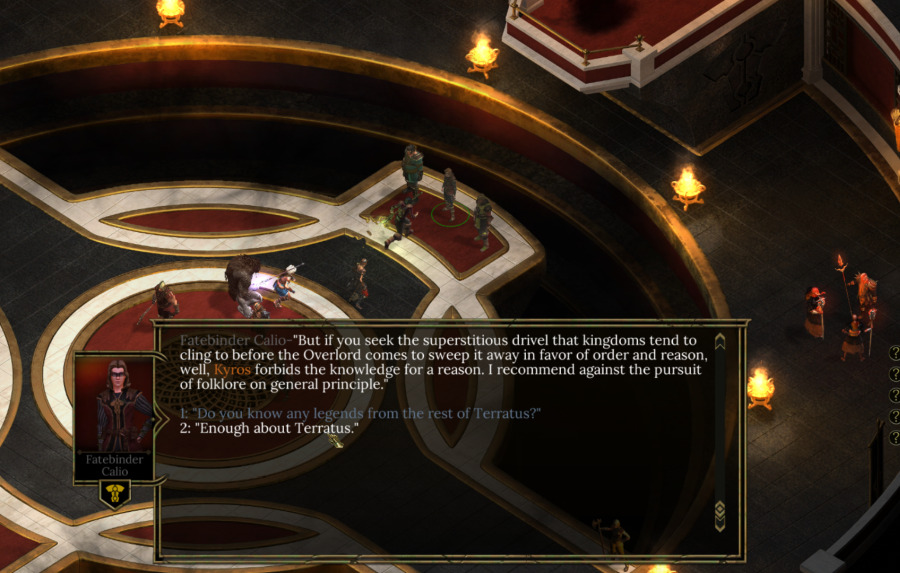
If you didn't see the theme yet, Calio will bluntly spell it out for you.

The entire point is to create a mindset among the faithful that Kyros' way is the only way and that a society that is not led by Kyros is damned to war, superstition, and collapse.
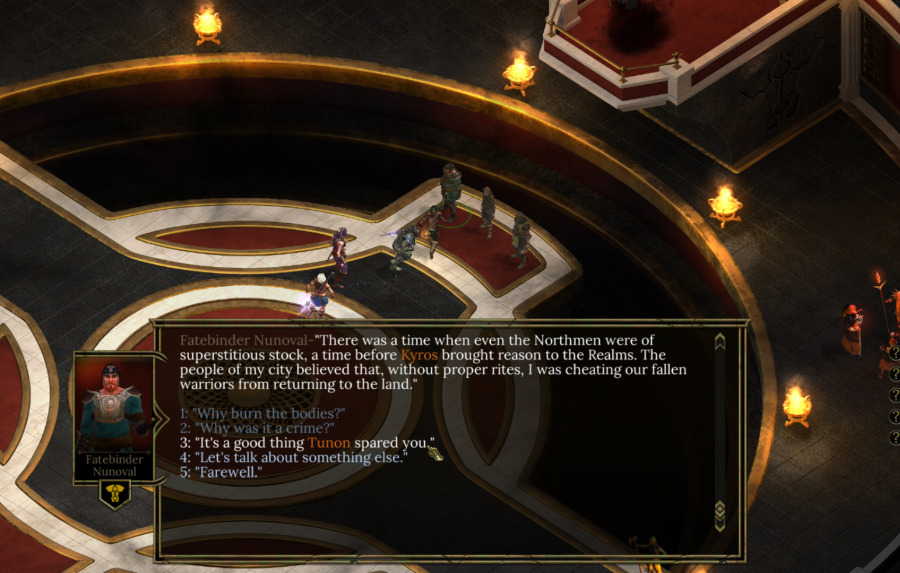
Look how Nunoval describes it, Kyros "brings reason" to the land. We've seen this before.
1984 posted:
The Party said that Oceania had never been in alliance with Eurasia. He, Winston Smith, knew that Oceania had been in alliance with Eurasia as short a time as four years ago. But where did that knowledge exist? Only in his own consciousness, which in any case must soon be annihilated. And if all others accepted the lie which the Party imposed--if all records told the same tale--then the lie passed into history and became truth. 'Who controls the past,' ran the Party slogan, 'controls the future: who controls the present controls the past.' And yet the past, though of its nature alterable, never had been altered. Whatever was true now was true from everlasting to everlasting. It was quite simple. All that was needed was an unending series of victories over your own memory. 'Reality control', they called it: in Newspeak, 'doublethink'.
This is of course so we can push the dogma that Kyros brings peace and prosperity to all with no real way to challenge it.
Blatantly Untrue Shit Tunon Said Earlier posted:
: The harvest blooms and blights by the will of Kyros.
This scenario should be familiar - Kyros is going out of her way to eradicate any sort of cultural or intellectual context that will let you change Kyros' laws as unjust or the legitimacy of Kyros to rule. It's straight out of 1984 where we have always been at war with Eastasia. The harvest has always been controlled by Kyros, who brings prosperity, but blights your crops...but has you share so is good. Kyros!
An Outside Context Problem, or, the Trouble with Power
The game has made it quite clear that Kyros' laws are designed to maintain the existing power structure over everything else. Kyros is infallible and may not be invoked lightly. Wizards have more privileges than you, and Archons have privileges above that. The socioeconomic class structures are based around who has magic and who doesn't, and attempts to gain more power are crushed ruthlessly via Bleden Mark or some application of the law. What the game doesn't explicitly call out is that the powerful have more context to see the entire system and need to somehow balance the evidence of their eyes and ears with the ideology the system is supposedly based on - whether that's becoming a cynic like Bleden Mark, a madman like Nerat, or just blinding yourself with your own ideology like Tunon. This is initially not a problem for the Fatebinder at the beginning of the game - this is an abnormal situation based on Kyros' laws, but we're true believers in Kyros the Overlord or we wouldn't have made it out of Tunon's training.
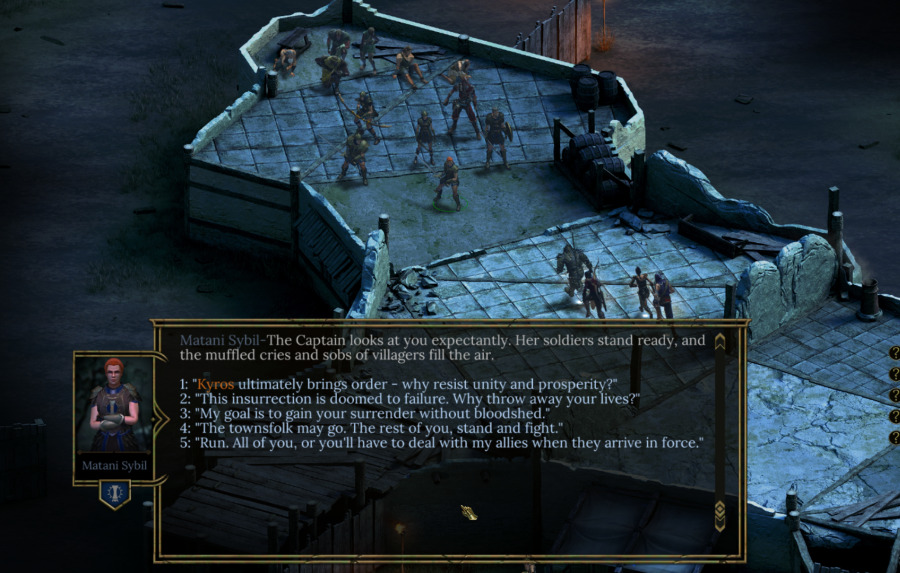
Note that the very first option is to repeat Kyros' pap about prosperity. The game makes it clear to the player in Act 1 that Kyros' laws don't work and that the feud between the Chorus and the Disfavored is very much a feature that makes a lie of Kyros' peace - but the player is NOT Cleopatra! Due to the limitations of modern gaming, we have a very narrow set of replies to draw on based on what Cleopatra is thinking, and most of the replies in Act 1 reflect that Cleopatra is a capable servant of empire raised on a diet of how great Kyros is, and our ultimate rationalization for the choices we make is that it's ultimately what Kyros wanted us to do. Tunon approves! Notice that, despite taking a Spire, there are no Bane in act 1. They don't appear because our actions aren't particularly challenging to a Kyrosian - we are carrying out the will of Kyros as told to us by her Edict, and we don't actually have the opportunity to reflect whether or not the system is broken. Ashe and Nerat are Bad Archons and if they'd just done what Kyros said to do we wouldn't be in this mess!
Cleopatra defends herself posted:
: I took the Citadel and satisfied Kyros' command. To this end, are my means not justified?
It's only when we receive our first instruction from Bleden Mark - to go to the Vellum Citadel and retrieve the forbidden Silent Archive - that the Bane begin to appear. As Cleopatra acquires power - most easily represented in the Spires - we, the players, and Cleopatra both get a bigger picture of what the empire looks like and how it actually functions. One of the running themes from Act 2 is that Kyros' laws don't just fail the empire in exceptional circumstances like the Vendrien Guard revolt or Raetommon's Clown Show, but that the laws don't work very well in day to day life either - see Essa attempting to commit suicide by Fatebinder.
Of course, the higher ups on some level either realize this or have found some way to rationalize it subconsciously.
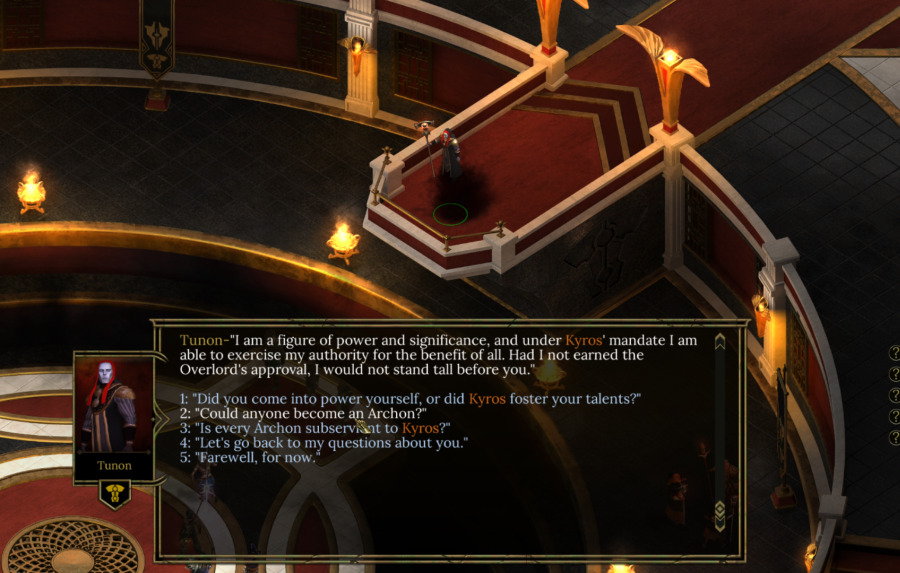
Tunon's coping strategy is to delude himself that he provides justice for everyone, while Bleden Mark retreats into cynicism and sends us after the forbidden Silent Archive, and this is the first instance in the game where the laws of Kyros actively start to screw us. We need the power that the Silent Archive gives, but the Silent Archive is forbidden by Kyros. This is breaking the law! Worse, the Silent Archive - and the "heretical" knowledge of the Vellum Citadel - provides us with information outside the boundaries laid by Kyros!
Hence the Bane. The Bane don't represent new ideas as much as the contextual knowledge of the past needed to create these ideas. Each encounter with the Bane gates off some sort of knowledge or experience that would change the worldview of Cleopatra and provide new context free of Kyros' conditioning and "reality control", as Orwell would put it.
Bleden Mark, on the Archive posted:
: Either way, you've filched the Silent Archive and can benefit from its influence. To be honest, even I don't know the full extent of what knowledge it can offer you, but I do know the Sages poured lifetimes of effort into it.
Per Lantry, the Sages are historians whose guidance was highly valued by the rulers of the Tiers due to - at least in part - their vast historical knowledge. The Bane need to be overcome in some way to reach this context, because they're the unwelcome intrusion of ideas into the wonderful indoctrination of Kyros. Cognitive dissonance, if you will.
1984 posted:
In a lucid moment Winston found that he was shouting with the others and kicking his heel violently against the rung of his chair. The horrible thing about the Two Minutes Hate was not that one was obliged toact a part, but, on the contrary, that it was impossible to avoid joining in. Within thirty seconds any pretence was always unnecessary. A hideous ecstasy of fear and vindictiveness, a desire to kill, to torture, to smash faces in with a sledge-hammer, seemed to flow through the whole group of people like an electric current, turning one even against one's will into a grimacing, screaming lunatic. And yet the rage that one felt was an abstract, undirected emotion which could be switched from one object to another like the flame of a blowlamp. Thus, at one moment Winston's hatred was not turned against Goldstein at all, but, on the contrary, against Big Brother, the Party, and the Thought Police; and at such moments his heart went out to the lonely, derided heretic on the screen, sole guardian of truth and sanity in a world of lies. And yet the very next instant he was at one with the people about him, and all that was said of Goldstein seemed to him to be true. At those moments his secret loathing of Big Brother changed into adoration, and Big Brother seemed to tower up, an invincible, fearless protector, standing like a rock against the hordes of Asia, and Goldstein, in spite of his isolation, his helplessness, and the doubt that hung about his very existence, seemed like some sinister enchanter, capable by the mere power of his voice of wrecking the structure of civilization.
This is of course the allegorical danger of the Bane - that you start to realize the truth and destroy yourself like Winston Smith acting against the system, or you realize that the system has turned you into a monster. THAT is why the Bane are attracted to magic, because magic is political power and the higher you rise in the Kyrosian system the closer you come to the truth that this system does not work and you are a bad person for enforcing these terrible rules. If we look at our core four Archons - Graven Ashe, the Voices of Nerat, Tunon, and Bleden Mark - they all have some way of burying this revelation. Graven Ashe tells himself he's doing it for his men and prides himself on his honor. Nerat knows the rules are a fucking joke and treats it as a game to play - remember how we found the Scarlet Chorus at the Citadel? - so he can get back to torturing and murdering people. Tunon hides under his metaphorical security blanket of telling himself he's doing it for the greater good, and Mark just hides behind cynicism while acknowledging he's killed people who didn't deserve it.
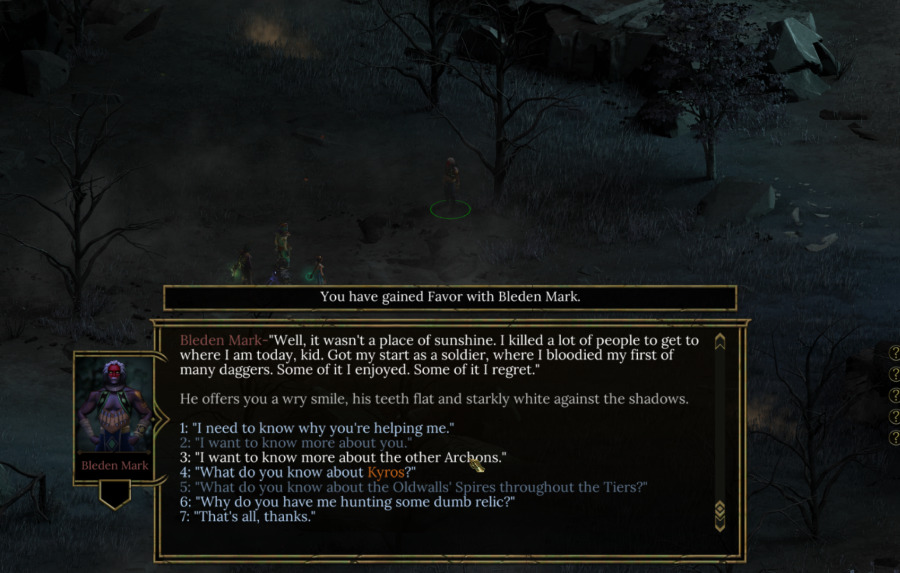
We can't avoid this confrontation, because ultimately we're going to need to learn the historical knowledge hidden in the Archive to have a chance at surviving the wrath of Ashe and Nerat.
With Raetommon it's even worse. Before we were breaking the law to ensure our own survival, now we are confronted with a situation where following Kyros' laws actively hurts not just us but the empire. We have to crush Raetommon's insurrection, but we can't go into the Oldwalls because that's forbidden. If we don't follow Raetommon into the Oldwalls his rebellion continues and the Brotherhood can use the law against the Kyrosians by just hiding there - proving that Kyros is in fact fallible for failing to foresee this!
One simple trick to not get caught! Kyros HATES him! posted:
: We can hole out and no one knows we're here! You're the first one I've seen in here who wasn't part of the Brotherhood.
The other revelation we learn is that despite being sworn to Tunon, the Forge-Bound break the Oldwalls laws on the down-low all the time, proving that not even the people who claim to respect the law actually uphold it in practice. That's why the boss of the section isn't Raetommon, but a Bane Havoc - it represents Cleopatra's attempts to come to terms with this new information that's shattering her worldview. The confrontation with the Big Bane at the end of the Oldwalls is Cleopatra trying to square everything she's been taught by Tunon and Kyros with her recent experience that the laws don't work. Kyros' Peace is a big lie, not even the supposed agents of the law respect the law - and the only way to save the law is to disobey the law thought completely infallible.
That's what I meant when I invoked new ideas and historical information - the Bane represent a context switch of new information that might break Cleo out of her Kyros induced indoctrination and could lead to dangerous ideas like "hey the Tiersmen didn't worship their kings as gods and had free markets" or the classic "Down with Big Brother", or just straight up destroy Cleo as she realizes what a terrible person she is. The Bane show up when we receive massive shocks to our Kyrosian indoctrination, and they will continue to appear as the Fatebinder sees more and more of the cracks in the system. Overcoming this dissonance - even if it is just subconscious rationalization bullshit - is critical for Cleopatra's path to power. The Bane aren't new. They just metaphorically encourage new thought.
Anyway, that's my interpretation of the Bane, and I hope I've been able to explain it in a way that makes sense and isn't just random babbling.